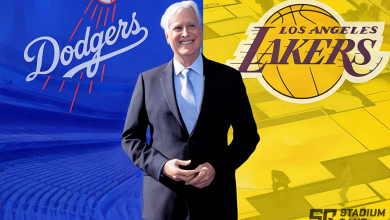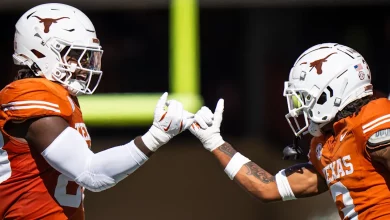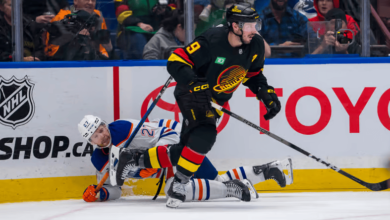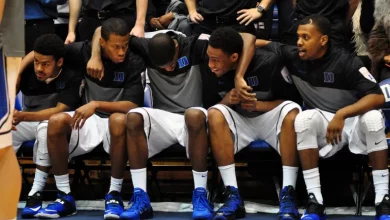Why Dan Hurley declined the Los Angeles Lakers offer
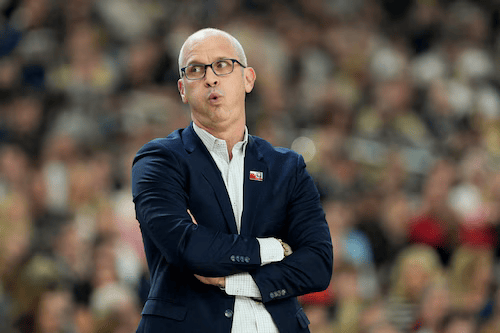
Why Dan Hurley Declined the Los Angeles Lakers Offer
In the world of professional sports, the decision to take on a new challenge—especially one that involves transitioning to a storied franchise like the Los Angeles Lakers—can be a life-altering one. For coaches, the opportunity to lead an NBA team, particularly one with the legacy and prestige of the Lakers, is a coveted prospect. So, when Dan Hurley, head coach of the UConn Huskies, received an offer from the Los Angeles Lakers, many assumed it would be a dream come true for the up-and-coming coach.
However, in an unexpected move, Hurley declined the Lakers’ offer, a decision that raised eyebrows across the basketball world. Hurley’s decision to turn down the chance to coach one of the most famous and successful franchises in the NBA was not only surprising but also strategically significant for both Hurley and the Lakers.
This article will explore the reasons behind Dan Hurley’s decision, examining his career trajectory, the factors that influenced his choice, and the broader implications for both Hurley and the Lakers. By delving into his decision-making process, we can better understand why Hurley opted to stay at UConn and what that means for his future as a coach in college basketball and the NBA.
A Rapid Rise in the Coaching World: Dan Hurley’s Background
Before analyzing why Hurley declined the Lakers’ offer, it’s important to understand his background and how he became one of the most respected figures in college basketball. Born into a basketball family, Hurley was no stranger to the sport. His father, Bob Hurley, Sr., was a legendary high school coach at St. Anthony High School in Jersey City, New Jersey. His brother, Bobby Hurley, was a standout player at Duke University and went on to play in the NBA. With basketball in his blood, Dan Hurley seemed destined to make his own mark on the game.
Hurley’s coaching career began in earnest at the high school level, where he achieved significant success. He became the head coach at St. Benedict’s Preparatory School, where his teams gained national attention for their success and talent development. His ability to develop young players and his tactical acumen quickly made him a sought-after coach at the college level.
In 2010, Hurley took over as head coach at Wagner College, a small school in Staten Island, New York. His tenure at Wagner was marked by a remarkable turnaround, as he led the Seahawks to their first NCAA tournament appearance in 10 years. This success propelled him to the head coaching position at Rhode Island, where he continued to build his reputation as a program builder, ultimately leading the Rams to their first NCAA tournament berth in nearly two decades.
However, it was his move to UConn in 2018 that truly elevated Hurley’s profile. At UConn, Hurley inherited a program that had fallen from its championship pedigree, but he quickly returned the Huskies to prominence. Under his leadership, UConn became a powerhouse in college basketball once again, culminating in a national championship victory in 2024.
By the time the Lakers’ offer came in 2025, Hurley had cemented his status as one of the top coaches in college basketball, with a growing reputation for his ability to turn programs around and win championships. It was only a matter of time before his name was linked with NBA job openings. However, his decision to stay at UConn, rather than take the Lakers’ offer, was deeply rooted in both personal and professional factors that had more to do with his long-term goals than with the immediate allure of coaching at the NBA level.
The Los Angeles Lakers: A Storied Franchise
The Los Angeles Lakers are, without question, one of the most prestigious and successful franchises in NBA history. With 17 championships, a roster filled with legendary players such as Magic Johnson, Kareem Abdul-Jabbar, Kobe Bryant, and LeBron James, the Lakers are synonymous with basketball excellence. The Lakers are known not only for their historical success but also for their larger-than-life personalities and their ability to draw attention both on and off the court.
When the Lakers come calling, it’s typically considered a once-in-a-lifetime opportunity for coaches, especially those without previous NBA head coaching experience. For Hurley, who had never coached at the NBA level, the chance to lead such an iconic team was undoubtedly enticing. The Lakers have long been in a rebuilding phase following the twilight years of Kobe Bryant’s career and the challenges surrounding LeBron James’ time with the franchise. They have relied on a mixture of veteran leadership and promising young talent, with hopes of returning to championship contention.
At the time of the offer, the Lakers were in need of a head coach to bring consistency to their efforts. The front office had been through several coaching changes in recent years, and there was a sense of urgency to find someone who could stabilize the team and lead them back to championship contention. Hurley’s name emerged as a candidate largely because of his ability to build successful programs from the ground up, his familiarity with elite basketball culture, and his success in guiding teams to championships.
Given his pedigree and success at UConn, Hurley seemed like an ideal fit for the Lakers—someone who could bring a high level of discipline, structure, and winning mentality to a team looking to return to prominence. So why did Hurley decline this prestigious opportunity?
Why Dan Hurley Declined the Lakers Offer: Key Factors
- Commitment to UConn and the College Game
One of the primary reasons Dan Hurley declined the Lakers’ offer was his deep commitment to UConn and the college basketball system. Hurley had built something special at UConn, and he understood the importance of long-term continuity in college sports. His journey at UConn had been one of gradual progress and steady growth, and the 2024 national championship was a validation of his philosophy and approach. Hurley’s ability to recruit top talent, develop players, and create a winning culture at the college level was something that mattered deeply to him.
For Hurley, college basketball offered a unique platform where he could mold young players, develop their skills, and influence their lives both on and off the court. Unlike the NBA, where the emphasis is often on short-term success and the pressure to win immediately is intense, college coaching allowed Hurley to build something lasting. The NCAA tournament, with its drama and unpredictability, provided a different kind of fulfillment compared to the grind of the NBA season. The ability to shape the futures of student-athletes and create a program with sustained success was a significant part of why Hurley chose to stay at UConn.
Moreover, Hurley had established strong relationships with his players and staff at UConn. Leaving for the NBA would mean severing those connections and starting fresh with a new set of players and personalities. Hurley’s loyalty to his players and the UConn community played a crucial role in his decision. While the Lakers’ offer was tempting, it didn’t outweigh his passion for coaching in college basketball.
- The NBA’s Demands and Expectations
Coaching in the NBA is a vastly different experience than coaching in college basketball. The demands of the job in the professional league are intense, and the expectations are often overwhelming. While Hurley had proven himself as a coach capable of handling high-pressure situations, he may have felt that the constant scrutiny and the unique challenges of the NBA were not the right fit for him at this point in his career.
The NBA is a star-driven league, and coaches are often judged based on the performance of their superstars. Hurley, despite his success at UConn, had no experience working with NBA-level talent or managing the personalities of high-paid professionals. The pressure to win and deliver results immediately in the NBA can be suffocating, especially for someone transitioning from the college game. Hurley may have recognized that the lifestyle and demands of coaching in the NBA could clash with his desire to build a long-lasting program in a less volatile environment.
- The Desire to Continue Building UConn’s Legacy
Hurley was not only the coach of the UConn Huskies; he was the steward of one of the most storied programs in college basketball history. UConn had a rich legacy of success under coaches like Jim Calhoun, and Hurley was now tasked with carrying that torch forward. After leading the team to a national championship in 2024, Hurley was positioned to continue building UConn’s basketball program into a perennial powerhouse. The opportunity to continue developing a team that was poised to remain competitive at the highest level of college basketball likely outweighed any appeal of coaching an NBA team.
Hurley’s legacy at UConn was something he held dear, and he may have viewed his decision to stay as a way to solidify his place in the program’s history. He understood that the job at UConn was one that would allow him to write his own story and leave a lasting impact on the college basketball landscape.
- Timing and Personal Factors
Finally, the timing of the Lakers’ offer may not have aligned with Hurley’s personal goals. After reaching the pinnacle of success at UConn with a national championship, Hurley may have felt that he was in the middle of a defining chapter of his career. Transitioning to the NBA, especially with a team like the Lakers, might have felt like an abrupt shift in direction.
Personal factors also played a role in Hurley’s decision. Family life, the stability of coaching at a university, and the chance to continue to develop his coaching philosophy in a familiar environment could have been key considerations in his choice.



